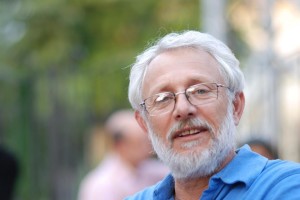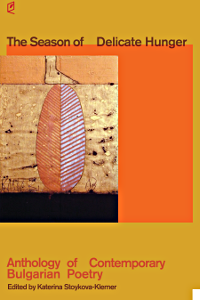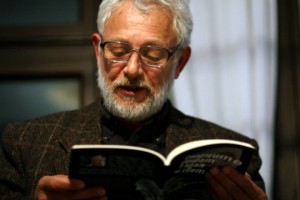Katerina Stoykova-Klemer interviewed poet and storyteller Sasho Serafimov for The Season of Delicate Hunger: Anthology of Contemporary Bulgarian Poetry. Here is Lydia Lecheva’s translation of that conversation.
 What would you like for the American readers to know about Bulgarian poetry?
What would you like for the American readers to know about Bulgarian poetry?
Beautiful poetry has no nationality, it is like air—invisible but vital for everyone alive because it is embedded in each of us. The entire spiritual wealth of the world comes from the source of poetry, where one soul speaks to another. Words are only the visual expression, the clothing of the invisible world. However, each nation’s poetry has its ancestral roots. The tree of life of my country has suffered a lot over millennia but has left its signs along the way—that is our language. It is exactly where our history stays alive, where knowledge lies, and using it, our ancestors went through pogroms and victories. There shines the golden scepter of King Simeon; also there, in the Cathedral of time, the brothers Cyril and Methodius, Clement, Gorazd and Angelarius have stood. There again, during the wild time of slavery, crystals of words, mixed with blood, glory and fire were born.
Language is a fine cutter which models the wonderful out of the invisible, but it could be a monster that eats its children if not taken care of. Language is the fashion of time, it is the basis of street folk music but equally of the classy “Rhapsody Vardar” by Pancho Vladiguerov; of the immortal poems of the Bulgarian great poets Hristo Botev, Peyo Yavorov, Hristo Smirnenski and Atanas Dalchev. This is the language of small poky houses and palaces, of the peaks and valleys of our Motherland, and overall, of us with our devious little thoughts and high-minded ideas.
In our speech the roots of past and present are intertwined; among words and sounds, there they are: roads to the world. Young Bulgarians take them in hope of a better life elsewhere. Even our songs follow those roads: today’s and tomorrow’s songs; anxious and happy songs. On the cobbled road of our speech one might hear the echo of good and evil or sense the smell of gunpowder and geranium. River is our word, river of life.
 What would you like for the American readers to know about you personally?
What would you like for the American readers to know about you personally?
Life is something that passes quickly, and whatever your way to live is, eventually life ends. Anyway, every one of us is a piece of the whole and I could hardly say something interesting about myself. I love the little things, and I measure myself against them, because both a tiny pebble and a huge rock live a very long time. Standing in front of the huge rock though, stunned we say, “It will live forever!” And what is eternal is something that has happened, is still happening, but is slowly ending.
So I live with what the day brings me, with my friends, my wife and children. Tomorrow is far away; tomorrow is far behind the seas; and even what tomorrow might be is just yesterday’s glow, which is yet to take place. Once I used to believe that life is the future. Now I think that life is past, present, future and inward simultaneously.
The History of Life
Don’t worry, the Earth is turning.
Everyone will take his place.
For each hat there will be a hanger.
For each ass—a comfortable chair.
Rejoice and kiss.
The hungry will see bread,
the thirsty will find water,
the sad will discover joy.
But gentlemen, don’t forget Death.
She also wants to sit with us.
Feels cozy among people.
Has the ability to join and split apart
with tears, pain and dust.
The history of life is brief.
Millennia attest to this.–Sasho Serafimov,
translated by
Katerina Stoykova-Klemer.
 Is there an American poet who has influenced you or has made a an impression on you? How do you interact with American poetry?
Is there an American poet who has influenced you or has made a an impression on you? How do you interact with American poetry?
There are two of them – Walt Whitman and Allen Ginsberg. “Eat, drink, give birth,” says Whitman in one of his poems. Everyone does this, but it was Whitman who said it, and that is the motto of my life. Yes, I read them both in translation, but the poets and the translators are equally great. Whitman is like the Universe itself; everything in it is in his poetry. Ginsberg is subtle and wise in cursing life, but he is so real that one could live peacefully in his poetry. I also like Charles Bukowski.
What forms of cultural exchange between Bulgaria and the U.S. would you find interesting, practical and helpful?
For young people in Bulgaria, there is no language barrier. American poetry is available to us, but how many know us overseas—it seems to me only a few. Therefore such anthologies are useful, as well as meetings, translations of individual authors, visits, and readings. Modern internet communications are important, but they still reflect only a small part of one’s state of mind; the emotions are illusory and actually do not carry the same energy as live contact.
What do you wish for the anthology and its readers?
I would like the anthology to become another door to the spiritual space of both nations. And for poetry to be a more important part of everyday life. Right now the world is run by politicians, not by sages. Let us hope that with God’s will, this little book will open wide paths between us.
More from Accents Publishing’s “Meet a Bulgarian Poet” series:
- Krasimir Vardyev Wants to See a Woman President
- Ivan Hristov:
- Ekaterina Yosifova
- Vladislav Hristov
- Valentin Dishev
- Emanuil Vidinski
Sasho Serafimov was born on August 30th, 1953 in Dobrich. He holds a degree from Slavic University in Sofia in social pedagogy. He is the author of six poetry books, most recently The Elderly Die at the End of the World, as well as a book of children’s stories, Confused Tales. Sasho’s play, The Teller of Tales, was awarded third place in the Golden Dolphin International Puppet Theatre Festival. He’s married and has a beard.
mexican drugstore online
https://cmqpharma.online/# buying prescription drugs in mexico
mexican drugstore online